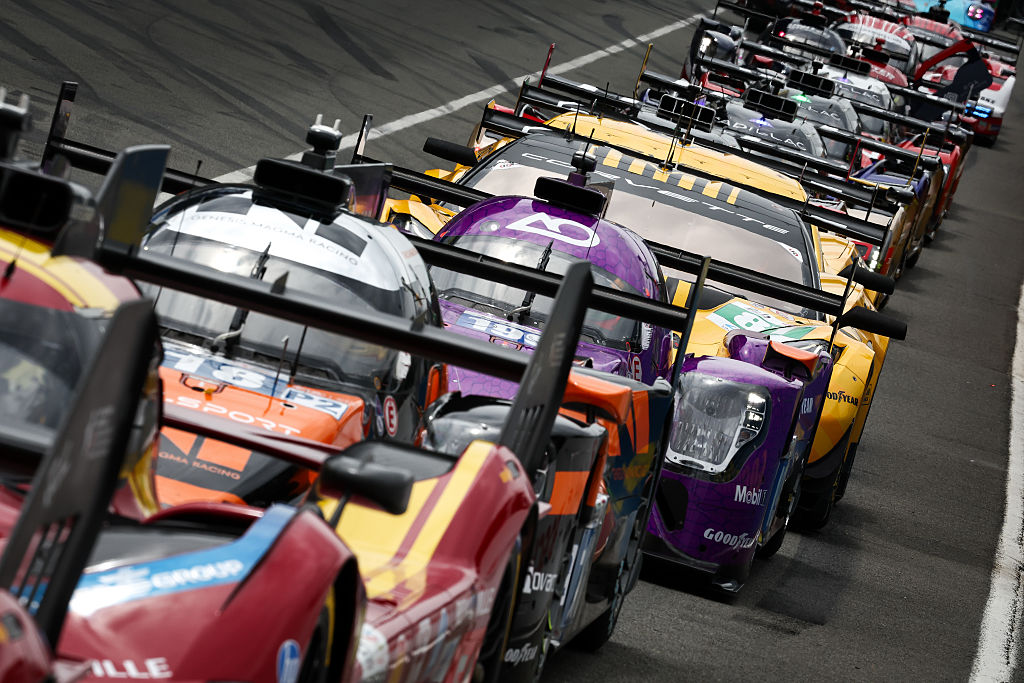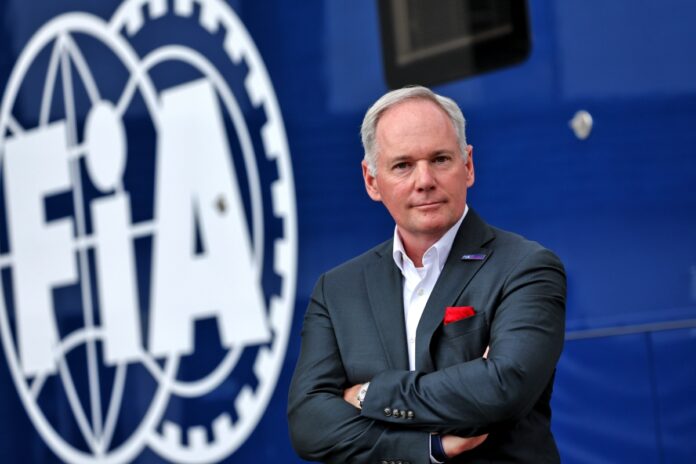Eight months after being fired by Mohammed Ben Sulayem, Tim Mayer is preparing to run against the incumbent FIA president in the election to be held later this year for the top position at motorsports’ international governing body.
American Mayer has had a varied career in motorsports, operating at high levels in IndyCar, Champ Car, IMSA and the FIA, while he can also list a spell as chairman of the Formula 1 stewards alongside time on the Endurance Commission, the Circuits Commission, the Off-Road Commission and the World Motor Sport Council.
But since November of last year, Mayer has been on the outside of the FIA after he was relieved of his duties by a text message from one of Ben Sulayem’s assistants, having had to represent the United States Grand Prix race organizers in a right of review.
After 34 years in the sport, Mayer said it was time to give back, but also to respond to what he described as the “almost desperation at the state of where we are” from former colleagues within the governing body.
- RELATED: Mayer confirms run against Ben Sulayem for FIA presidency
Much of Mayer’s motivation comes from wanting to offer an alternative to Ben Sulayem’s leadership, despite telling RACER that he does so at a time where running for the presidency has been made intentionally more difficult.
“If you look over the last four general assemblies,” he says, “there have been statute changes that have been done that they’ve said, ‘Oh, this is a modernization. This is democratization. This is for the integrity of the FIA.’ And when you look at them holistically over the last four general assemblies, what you will see is that this has been the biggest power grab in the history of the FIA. And it’s all about centralization of power into one office.
“So, yes, it is considerably more difficult, deliberately so. And it’s not in the interest of the members.
“Unfortunately, when you look at each one of these changes individually, as they are presented to the members, each one of them sounds reasonable. But when you look at them as a whole, not so much.”
To his point of the difficulty, Mayer is not announcing the names of some of his key team members yet, noting that it is a disadvantage to do so based on the way the elections are structured.
The 59-year-old makes clear that some of his pledges are similar to Ben Sulayem’s back in 2021, but believes the FIA member clubs have not seen the current president deliver on those promises during a tenure that has so far seen a high level of turnover among senior personnel, and garnered claims of a lack of transparency.
“Mohammed ran on some good ideas: Focusing on the smaller clubs, giving power to the smaller clubs was a good idea,” says Mayer. “The idea of reform at the FIA was a good idea. But what we’ve seen is an illusion. And it’s an illusion of reform. It’s an illusion of integrity.
“We’ve got a situation now where Mohammed has the power to unilaterally dismiss FIA Senate members. Well, the FIA Senate is where the ethics and financial oversight is supposed to happen. So he can unilaterally dismiss people that have been appointed to potentially provide oversight for him. I don’t know any so-called democratic institution where that can be the case.
“We’re looking at transparency, and he ran on transparency, but the reporting back to the members is less transparent than it ever has been.
“He’s run on the idea that the organization should be diverse and include a variety of voices. But almost the entire senior leadership team that he appointed – including, and especially, diverse voices, some extremely competent women – have been pushed out. And why? Because they told him the truth.
“So that’s incredibly problematic. You cannot seriously be talking about diversity, inclusion of diverse voices, and then lose an entire generation of leadership when they say no to you. The FIA is not going to be an effective organization with that management style.”
His days as an F1 steward taught Mayer (at left) that “the most powerful organizations are ones that work as a team.” Jose-Maria Rubio/Sutton Images
Although Mayer says the first term under Ben Sulayem has seen the president given more power within the FIA, should the American challenger be successful in his campaign, he insists he would look to undo many of those changes, rather than utilize that power himself.
“My experience everywhere I’ve ever been is that the most powerful organizations are ones that work as a team,” he says. “And so, if you’re going to work as a team, you need to empower all of the structures that you have. So we need to return clarity to the General Assembly, so that the individual clubs can vote and can make their decisions in a clear and effective way.
“We need to return power to the World Council members who’ve been voted in place to represent all of those member clubs. Well, right now, those World Council members aren’t even allowed to talk to the member clubs about the content of the meetings. They can’t consult with the people that they’ve been elected to represent.
“So, yes, it’s definitely a matter of reversing many of the policies that have basically disenfranchised the member clubs and have disenfranchised the World Councils and have disenfranchised the senior leadership.
“We need to work as a team. No one person can manage a worldwide organization. It’s absolutely impossible. So we need good management. We need professional management that we will recruit back to the FIA. We would need good political leaders, and we need debate.
“I’ve never been anywhere where the dictates of one person have ended up with a successful organization. It has always taken a team of people coming up with great ideas and being empowered to execute them.
“And, if you think of the president of the FIA as a CEO or as a president of a company, the role of the president is to create a vision and then provide the people that work for that person the tools they need to execute on that vision. That’s what my management style is – it’s to nurture leadership, to give them the opportunity to come up with ideas, and so on and so forth, as long as it aligns with the vision. And that’s the key to success everywhere I’ve ever seen.”
It’s clear that the direction of the FIA under Ben Sulayem is a focal point for Mayer as he launches his bid, but it is not the only one. Given the influence of his father – former McLaren team principal Teddy Mayer – and the periods when their professional paths crossed, and even clashed at times, he says he has the experience required to lead an organization that has both sporting and mobility arms.
Mayer’s manifesto includes a primary focus on the growth of the FIA’s undeveloped regions, and what he describes as “delivering the basics” when it comes to the professional side of the sport at an international level.
“What I mean by that is, there are some remarkable individuals helping to manage and to officiate the sport, but I don’t think that the FIA is doing a good job of developing and nurturing a deep pool of officials,” he says. “I mean, it’s literally one row deep in Formula 1 at the top level of the sport. We got that one level by plundering F2 and F3. And after that, it gets quite thin.
“During the pandemic, we lost the stewards seminars. They did just one more, but we have this HPP [High Performance Program], which is, I think, a very thin attempt at this. And we need to develop that deep pool of talent, which is a difficult job, but it’s a critical one. Ultimately, what the FIA offers to the sport is that talented group of people.
“I was lucky enough to be around [long-time F1 race director, until his death in 2019] Charlie Whiting for 15 years or so, and that was fantastic, but we need to develop a whole new generation of Charlie Whitings.”

Mayer compares the forward planning of the WEC, which is brimming with manufacturer interest, favorably with that of F1 in recent years. James Moy Photography/Getty Images
Mayer also wants to see the FIA take the lead in developing future regulations far beyond the next set, citing the manufacturer interest in the World Endurance Championship as being down to an understandable pathway over the long term.
“We should be talking about regulations for 2030, 2032, 2034, not what are we doing in the 2020s,” he says. “And I think that’s true in rally and rallycross and in basically all of our major championships. I think that’s a critical element of the FIA that is not being done very well at the moment.”
Although Mayer’s sporting experience is clear, he believes the FIA’s reputation has been damaged in recent years, and that has an impact on its ability to be successful in its mobility responsibilities.
“As much as I am somebody who’s grown up in the sport – I mean, literally grown up in the sport – I am also somebody who has incredible respect for the mobility side of this,” he emphasizes. “And it’s where, from my perspective, potentially I can have the biggest impact in giving back to those smaller mobility clubs and allowing them to work on their agendas and impact government strategy and genuinely have a lasting effect on millions of people’s lives.
“That’s a pretty remarkable opportunity. And so that’s another, strong reason why I’m running, because I genuinely think we need to rebuild the global reputation of the FIA so that it can have that impact on millions of people’s lives.”
Mayer says he has been leaning on experts to build out the mobility side of his manifesto because it’s his area of least experience. But at the same time, he says it’s proof of his approach to leadership, as he wants to bring in a diverse group of members to challenge him.
“We’ve got to bring people around the table and really understand the problems and come up with genuine ideas to fix them,” he notes. “Not just say, ‘I know better,’ because I don’t.”
